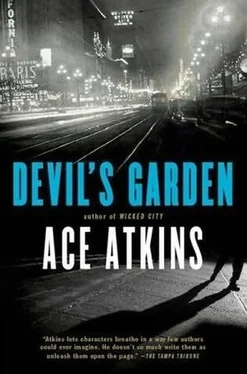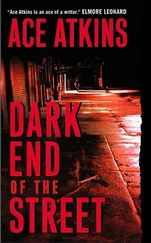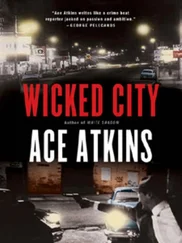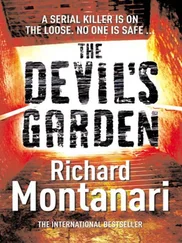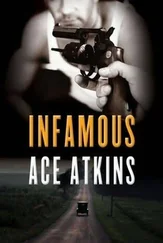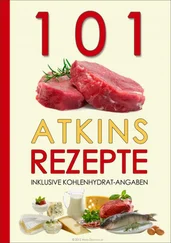“Yes, certainly.”
“What did you do?”
“I put… changed a record on the phonograph. I think I danced with Miss Blake. I am not sure what I did.”
“Then you don’t recall what you did. You don’t recall doing anything?”
“I was around the room. I don’t just exactly know what I was doing.”
“As a matter of fact, when you arose on the fifth of September and went into the bathroom to clean up it was your intention then to get ready to go out riding in your Pierce-Arrow limousine with Mrs. Taube?”
“Yes.”
“But you did not get dressed at that time?”
“No, these people kept coming in and I was trying to be sociable.”
“With whom?”
“With them.”
“They were not your guests?”
“No. I didn’t want to insult them.”
“You didn’t invite them there, did you?”
“No, sir.”
“With the exception of Miss Rappe, you didn’t know anybody that was coming there at that time, any of these young ladies?”
“No.”
“You did not invite them?”
“No.”
And you didn’t tell anyone else to invite them?”
“No.”
“And they were not your guests?”
“No.”
“They just appeared as if by magic?”
“They appeared.”
“And you don’t know how long a time elapsed from the time that Miss Rappe went into room 1221 until you went into 1219?”
McNab stood. It was the first time that he’d objected in the two hours of grilling by U’Ren. He smiled at the jury, letting them know he understood this silly weasel-faced little man, and then smiled at Louderback. “If the court pleases, we are supposed to end this trial sometime. I object to the same question being asked more than ten times.”
The courtroom laughed. Louderback did not.
“Proceed with the examination,” he said.
“Very well,” U’Ren said. “Answer the question.”
Roscoe scratched the back of his neck and looked at the jury. “What was it?”
Two of the jury, Fritze and Sayre, smiled.
He had ’em.
The baby cried for two hours straight. Sam finished his coffee, took a shower, and changed into some fresh clothes, tugging on his cap and walking down to the first floor and out on Eddy Street. Newsboys shouted from corners that the jury was out on the Arbuckle case, yelling, “Will Fatty Fall?” and “Fatty’s Last Stand” and the like. Sam walked with no direction in mind, absently smoking cigarettes and trudging forward, just keeping his feet moving, and suddenly found himself at Powell. A cable car idled in front of him and he got on, winded, taking a seat on an empty bench, listening to his rasping lungs as the bell clanged and the cable caught and the whole damn box made its creaky way up Nob Hill.
He could still hear the baby. See Jose’s face.
The cable car passed the St. Francis and limousines and women in long furs, jewelry shops, solid restaurants with waiters and white tablecloths, tobacconists and men’s clothing shops. Sam absently felt at his tweeds, tearing out a loose thread, and sat back on the hard seat, just letting the cable car do all the work on the ascension as he smoked and watched, feeling good about not having to hoof it anymore, not caring where the damn thing ended up.
The car crested at Nob Hill and, for the hell of it, he got off. He liked being able to do that. He looked at the four corners and spotted the California line that intersected at the top of the hill. He waited a beat and caught the car as it rattled past, full of businessmen and ladies on their way to teas, and held tight to the brass fitting during the rickety descent, the brakemen catching the cable, letting go, and catching the cable again during the jerky ride.
A few stops and they were at Fillmore, the street opening up to him in early night, iron buttresses arcing the street, lit up with a million small white bulbs, reminding Sam of the midways he worked back east. There were flivvers and trucks parked all along the street. Three- and four-story buildings and jutting turrets and hand-painted signs for fish merchants and pawnshops and Italian barbers.
He dodged a streetcar and another heading the opposite direction and wandered into a nickelodeon. He popped a coin in a machine and watched the pages flip, showing the devastation of the big Quake, the flattened city, smoke rising from the ashes, the tent city built on the rubble.
Men boiled crabs on the street. Big wheels of cheese and fresh fruit were displayed from market windows, long dried sausages and peppers. There were dope pushers with dark-ringed eyes and prostitutes with sagging stockings. Sam smoked and caught all of them, starting up the night like the first strings of a symphony.
He turned and walked backward, heading out from the little district, his eye on a young man in a black hat holding two black satchels, one in each hand, as if they both contained a tremendous weight. The man’s head was down; slump-shouldered, he walked across the tracks.
There was music from a high window, opera with the soaring voice of Carmen, and a man in a tattered undershirt looked down at Sam, listening to his private songs. The man scratched his chest and his dirty chin and closed the window.
The steel buttresses of light ended and there was no music. The hard soles of his feet kept Sam company. He saw the Dark Man in his mind, seeing him spin and twirl, caught in the current, heading through the Golden Gate and far out into the ocean.
He heard the clang of a cable car behind him. He kept walking downhill.
He stepped off the curb to cross the street. And for some reason he would never understand, he simply stepped back, to check his pockets for change or perhaps a cigarette. He could not recall.
There was a tremendous pop and the earth rumbled beneath him and for a moment he thought it was a tremor, but then the entire raging, rattling box of a cable car crossed an inch from his nose, a wind crossing his face like a giant breath, and skittered and screamed downhill toward the bay, roaring with great yells and shrieks from the passengers, until there was a tremendous crash into an electric pole, the pole breaking in two as the cable car finally came to rest in the dead center of a house’s front porch.
Sam had not moved his feet since stepping back on the curb.
He could not move.
He was still yet his heart jackhammered in his chest. He could still feel the cut of wind across his nose. More screams and people yelling came from below and Sam ran downhill to the corner of Green, where a crowd had formed, as black snakes of electric cable jumped and zapped against the street, showering the night in bright sparks. He helped an old woman and the conductor from the heap. Four others had been helped into the street. They had been cut and bruised. One man walked in a circle, still in shock.
Sam walked back up Fillmore to where the car had gone loose. In the street, the cable continued to whirl and flow in the narrow gash, never stopping, never noticing the weight was gone.
THE JURY WAS OUT, the closings wrapped up, and at eight o’clock Roscoe returned to the courtroom with Minta. The big room was empty and quiet. A few newspapermen lay on benches smoking and reading back through their notebooks; other newsmen sat on staircases and occupied phone booths, waiting for the latest. McNab said it would be tomorrow at best. Told the boys from his firm to ring him at home if there was something brewing. Roscoe walked over to the jury box. Minta was restless, not wanting to have to dodge reporters. Half of them were out on the streets covering a visit by Marshal Foch, the French war hero, and that goddamn cat show at the St. Francis. Roscoe was officially banned from the hotel, but a stray tom called Mr. Whiskers and even a little bastard called Charlie Chaplin-on account of a black smudge under its nose-were welcome. A bunch of smelly cats purring and scratching at the furniture, taking dumps in the place, even if they did cost a few thousand like the papers said.
Читать дальше
